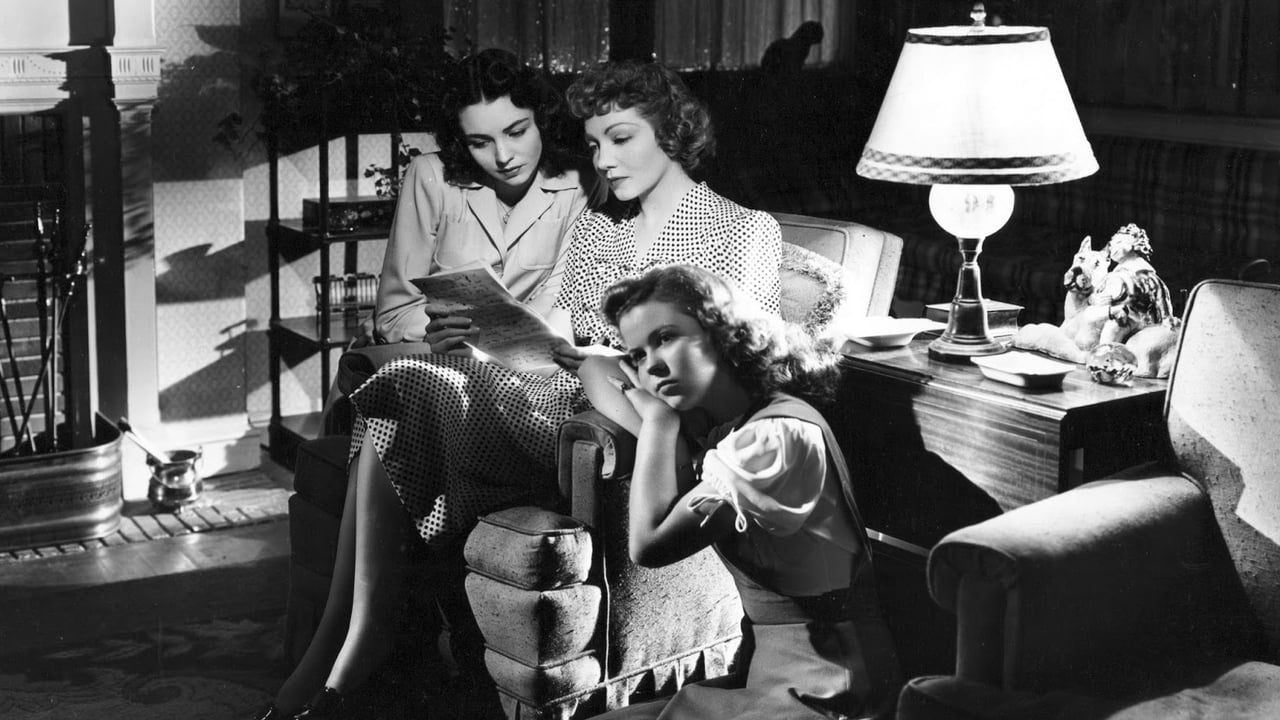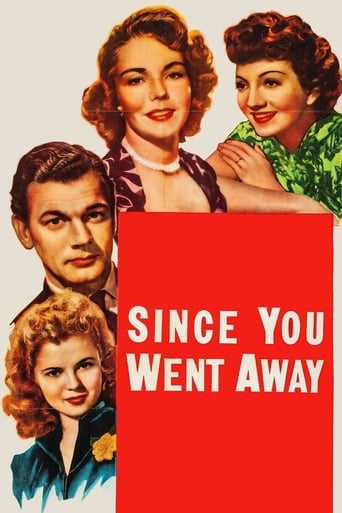

Strong and Moving!
... View MorePlot so thin, it passes unnoticed.
... View MoreGood , But It Is Overrated By Some
... View MoreClever and entertaining enough to recommend even to members of the 1%
... View MoreTwo years before Fredric March came home to his wife and children in "The Best Years of Our Lives", there was "Since You Went Away", the salute to the lonely wives waiting for their man to return. Of course, not every wife waiting for the spouse looked like Claudette Colbert, so it is no wonder that Claudette, thanks to painter Joseph Cotten, gets her own pin-up to remind the boys of what they were fighting for. Unlike other pin-up girls of the 1940's, Claudette had been around for a long time making movies, but she still looked gorgeous and could still pack in audiences during this time of her career.Usually cast in romantic comedies, Colbert rarely had a chance to show off her dramatic talents, although films such as "Drums Along the Mohawk", "Arise My Love" and "Boom Town" prove differently amongst her usual screwball antics. She's dealing with the typical crisis of wives during the war-not enough money coming in, bill collectors calling and problems with the children. In this case, its her two daughters, the beautiful Jennifer Jones and the precocious Shirley Temple. Forced to let her wonderful cook (Hattie McDaniel) go, Colbert turns to her social engagements for solace, and this includes luncheons with the snooty Agnes Moorehead who seems to be more interested in her own publicity than the one going on with the boys overseas. When Colbert rents a room to the elderly Monty Woolley, a crotchety old man who doesn't at all hit it off with either Temple or the family bulldog, Moorehead is aghast. Then, Jennifer Jones meets Woolley's handsome grandson (Robert Walker), and romance slowly blooms. One episode has Jones and Walker being hassled by a sailor (the very handsome Guy Madison) then bringing them along on their date, simply because they know he's lonely.As for Colbert's friendship with painter Cotten, its enough to get Moorehead suspicious again, but Colbert is totally loyal to her husband. Of course, the predictable telegram arrives, telling of her husband's absence, but in wartime, sometimes husbands do return, especially in Hollywood movies where for the most part, a happy ending was much needed. Among the major players, Temple is the weak spot, but her role really is limited, so that softens the blow of her sulking and pouty impish performance.This is the American homefront at its most clean-cut. Of course, not everybody lived the way Colbert and her family did, and even got free cooking to boot as at another point, the feisty McDaniel returns, "I needs my solitude and privitation", she claims, keeping the other position as a day job but needing a place to get away from the family she hasn't quite hit it off with as much as Colbert's. This is quite ironic considering Colbert's friendship with another movie maid, the magnificently sweet Louise Beavers just a decade before in the original "Imitation of Life". McDaniels is a lot more cynical yet equally as lovable as Beavers, so it is easy to see why certain film books sometimes confuse the two heavyset but wonderful black character actors.There's room for plenty of tears here as lovers are torn apart (the famous scene between Jones and Walker saying goodbye at the train depot) or Colbert dealing with a sudden telegram. Everything here is touching, and even if made in the typical Hollywood fashion, producer David O. Selznick and director John Cromwell get everything just right. Throw in a last minute war speech by the preacher (Lionel Barrymore) and you've got the feel-good war drama that provided hope for audiences around the country and even the world.
... View MoreSelznick's tribute to the women on the home front during WWII is a fine piece of entertainment with a flock of excellent performances. Claudette Colbert gives the film a solid center as the sheltered, disconnected wife who slowly becomes aware of the importance of her involvement in the war effort. Shirley Temple is pert as the chipper younger daughter, however Jennifer Jones is really terrible in her early scenes, she's too old to be believable as a teen and by trying to compensate for that with preciousness she is extremely irritating. She's much better in the second part of the film when her character matures. Her scenes with Robert Walker are lovely, odd since they were married in real life and breaking up during the making of the film which he took very badly. The picture itself is quite long but once you get use to its rhythm it flows right along with some powerful scenes and beautiful imagery.
... View MoreTHREE hours long, it's crammed with 1940s stars in main or cameo roles: Claudette Colbert, Jennifer Jones, Shirley Temple, Joseph Cotten, Monty Wooley, Lionel Barrymore, Robert Walker, Hattie McDaniels, Agnes Moorehead, Keenan Wynn, etc. Set in the middle of WW-II, a caring husband leaves his wife (Colbert) and daughters (Jones, Temple) to enlist and serve in the Army. The plot deals with his family's coping with his absence, being patriotic & supportive of the war effort, hoping to help him & all others return home safely.This was produced in the middle of WW-II (but, of course, they'd have no idea at that time it was then the halfway point): when food & gas rationing was the norm, tin cans*, kitchen grease*, and scrap metal* were being harvested from all civilians to help the war effort, and women were suddenly, increasingly, being recruited and trained to work in "defense plants:" shipyards, aircraft building, machine tool making, or truck driving, etc., and all kinds of jobs formerly served only by men.It's mainly, patently, a work of wartime patriotic propaganda, exhorting viewers to keep the faith with American ideals, enlisting God, to stay faithful to the brave men defending our country, and "keep the home fires burning" so that all will treasure a return to the land, family, and values they love. It's idealistic--displaying a family with "all the right" motives and responses. It seems designed to provide patterns for ideal behaviors by civilians while also assuring those in the military that their family members, absent from them, were behaving conscientiously at home.This film is definitely a period piece, depicting fairly accurately the idealized family values & roles (including race relations), etc, of THAT era. And, despite the severe limitations of the screenplay & plot, IMO these actors do a great job: Colbert provides the solid foundation on which all is built; Jennifer Jones (then 24) is a convincing teenager (17-->20) whose first love is KIA (Killed in Action); Shirley Temple (then 15-16) is a maturing mid-teen. Hattie McDaniels, Hollywood's first notable black actress, plays a stereotyped loyal family maid who always mangles the English language in "Amos & Andy" fashion.Ratings: for its worth as an interesting narrative, possibly 5 or 6 of 10. BUT, for its worth as a record of our "ideal" template of American family's values and functioning DURING THAT WARTIME ERA, I'll give it a 9 of 10. Averaging these two --> 7 of 10.(My companion couldn't stand the over-the-top feel of the patriotic propaganda and "patness" of the story line; she walked out at the 150 minute mark. Many will feel the same way; I did, too, but wanted to see if the ending I forecast would be fulfilled. It was. Not hard to do: it was produced to make both civilians & military peeps feel comforted & supported.)[* For those unfamiliar with the extensive WW-II civilian recycling, see http://www.daytonhistorybooks.com/page/page/1652512.htm or google "WW-II civilian kitchen grease, cans, paper" for many other descriptions.](And FWIW, I'm a veteran of WW-II & the Korean War.)
... View MoreWhat's different about this war-era film is that it's not about military battles, but rather about the emotional battles faced by those left at home during the war. And it does a particularly fine job in portraying the long wait to see the end of the war and see if loved ones were coming home. I can't really think of another film that accomplishes this, and subtlety demonstrates the little things that Americans endured throughout the war. It's a long film, but then again, it was a long war.I should mention one thing that I found annoying -- the lovely score by Max Steiner -- which won him an Academy Award. A wonderful score...but too loud and overpowering, nearly drowning out some of the dialog. I was reminded of an Oscar broadcast years ago when Dean Martin and Raquel Welch were presenters for the best score award (pun obviously intended). Welch said that it had been noted that the best score enhances the film while not being noticed. To which Dean replied, "To which the late Max Steiner said, 'Then what the hell good is it.'" That may have been an accurate story based on this film.David O. Selznick created a wonderful film here, based on a true story. The performances were superb, with the possible exception of Shirley Temple as the younger daughter. Claudette Colbert is simply superb, and of course, that's not unusual. Jennifer Jones -- not usually a favorite of mine -- was wonderful as the older daughter. Monty Woolley doesn't play a buffoon in this film, but instead turns in a sensitive performance as an uncle of a man who is about to go off to war. Joseph Cotten is believable as a family friend who is a bit of a Navy playboy. And the wonderful Hattie McDaniel has, perhaps, her best role since GWTW. Agnew Moorehead played a real b---- in this film...not an appealing role at all.This is a memorable film not to be missed.
... View More